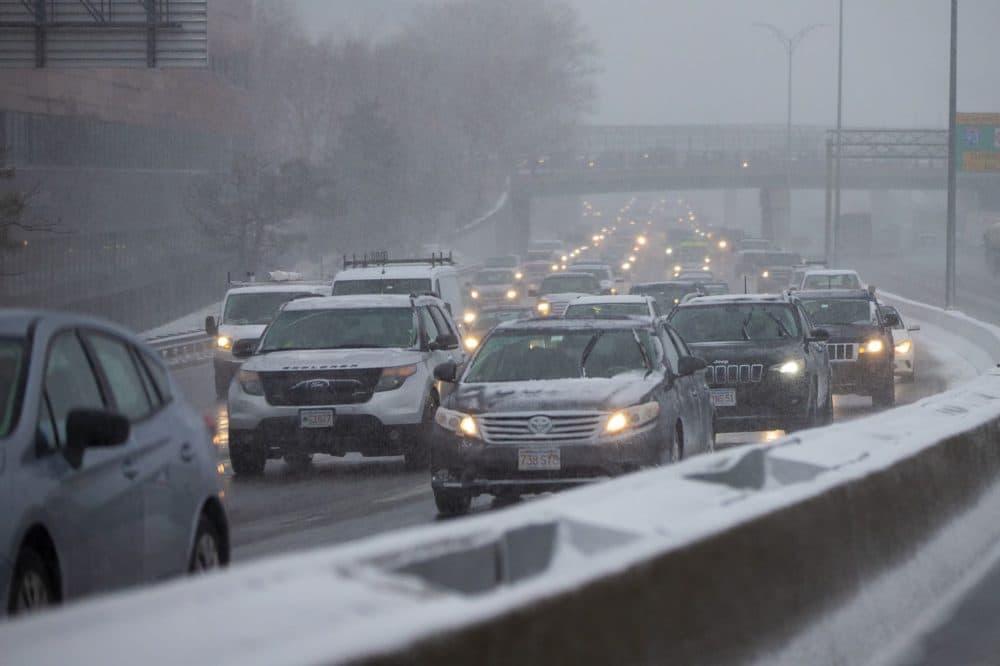Advertisement
Commentary
Fighting Climate Change Isn't Free. But A New Plan Could Ease Traffic And Cut Emissions In An Equitable Way

In Massachusetts, the word “transportation” conjures images of choked highways, rickety bridges and derailed subway cars. The frustration, inconvenience and loss of economic productivity we all incur due to transportation shortcomings constitute a painful cost to our quality of life.
Transportation that is powered by fossil fuels exacts still more costs, due to the pollution that it generates. It exacerbates respiratory diseases and it is the largest source of climate-warming greenhouse gases — 43% of Massachusetts’ greenhouse gas emissions come from the transportation sector.
Responding to the increasing distress around transportation, the Baker administration, in collaboration with other eastern states, has made public new details of an innovative regional plan, called the Transportation Climate Initiative (TCI). The plan is designed to raise needed revenue and ratchet down fossil-fuel emissions that contribute to serious public health problems and climate change.
It would indirectly add a small amount to the cost of gasoline and diesel fuel at the pump in Massachusetts, and so it acts, in effect, as a tax. Any levy that the state imposes on the public must be not only justified but just. TCI is both.
The Transportation and Climate Initiative is a regional cap-and-invest program. Twelve eastern states and the District of Columbia would agree to set a cap on emissions by requiring wholesalers of transportation fuels to purchase, from the states, pollution allowances in proportion to the total carbon content of the fuel they sell. The pollution allowances would be limited — thus the “cap” — and decline in number every year while increasing in price. The states independently invest the money they collect to improve transportation and limit pollution.
Any levy that the state imposes on the public must be not only justified but just. TCI is both.
The justification for TCI is clear. Transportation planners have long wishlists of projects to address a multitude of troubles. A report earlier this year estimated Greater Boston’s rush-hour congestion to be the nation’s worst. Our commuter rail system needs to be electrified. The MBTA is in continual crisis. The eastern and western halves of the state aren’t connected by passenger rail.
All these problems require vision, planning and money, and proceeds from TCI would make a meaningful dent.
But the goals of TCI are not limited to fixing transportation. The urgency of the climate crisis is central to the rationale for the policy. TCI aims to reduce greenhouse gas emissions from the transportation sector by putting a price on carbon pollution and by making investments that will induce people to use modes of transportation other than single-occupant gas-powered vehicles.
There is broad agreement among economists of all political persuasions that a predictable and transparent pricing mechanism that captures the environmental cost of burning fossil fuels will be essential for driving the transition to renewable energy throughout the economy. As Massachusetts strives to meet its ambitious climate goals for 2050, the emissions reductions achievable through TCI will be critical, especially in the absence of carbon taxes at the national level. As a regional measure, TCI enables its member states to impose a carbon price without fear of neighboring states gaining a competitive advantage.
The investment component of TCI complements its price signal to further reduce emissions. Proceeds from the policy would foster a shift away from the gas-powered automobile by helping to fund things like bicycle and pedestrian projects, electric vehicles, regional rail, and most importantly, public transit. Gov. Baker has already indicated that he would allocate a significant fraction of the money from TCI to the MBTA and other mass transit.
Advertisement
So the need for TCI as a source of transportation funding and a tool to address greenhouse gas emissions is evident. But is it fair? Critics claim that TCI is nothing but a regressive gas tax that unfairly burdens those who can least afford it.
Getting the details of TCI right will determine just how equitable it turns out to be.
The answer to the fairness question depends on how the states invest the revenues. In Massachusetts, a bill currently in committee in the Legislature, sponsored by Rep. Lori Ehrlich and Sen. Eric Lesser, would establish a transportation trust fund with the purpose of ensuring that TCI is equitable across geographies and income levels.
Getting the details of TCI right will determine just how equitable it turns out to be. The proposed legislation seeks to expand transportation services in low-income communities, improve access to electric vehicles, promote transit-oriented affordable housing, and deploy emission-free electric buses in locales with high exposure to asthma-inducing diesel emissions.
A critical feature of the Ehrlich-Lesser bill is that the board charged with the oversight of the proposed trust fund would include representation from rural areas, low-income communities, and communities that have historically suffered the most environmental harm.
Massachusetts needs the TCI framework to address the interconnected crises of our failing transportation systems and the urgent need to rapidly decarbonize our economy. There is solid evidence that the policy can be implemented with equity at the forefront. TCI is an investment opportunity that Massachusetts would be very unwise to forego.
